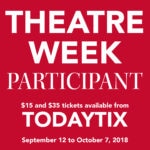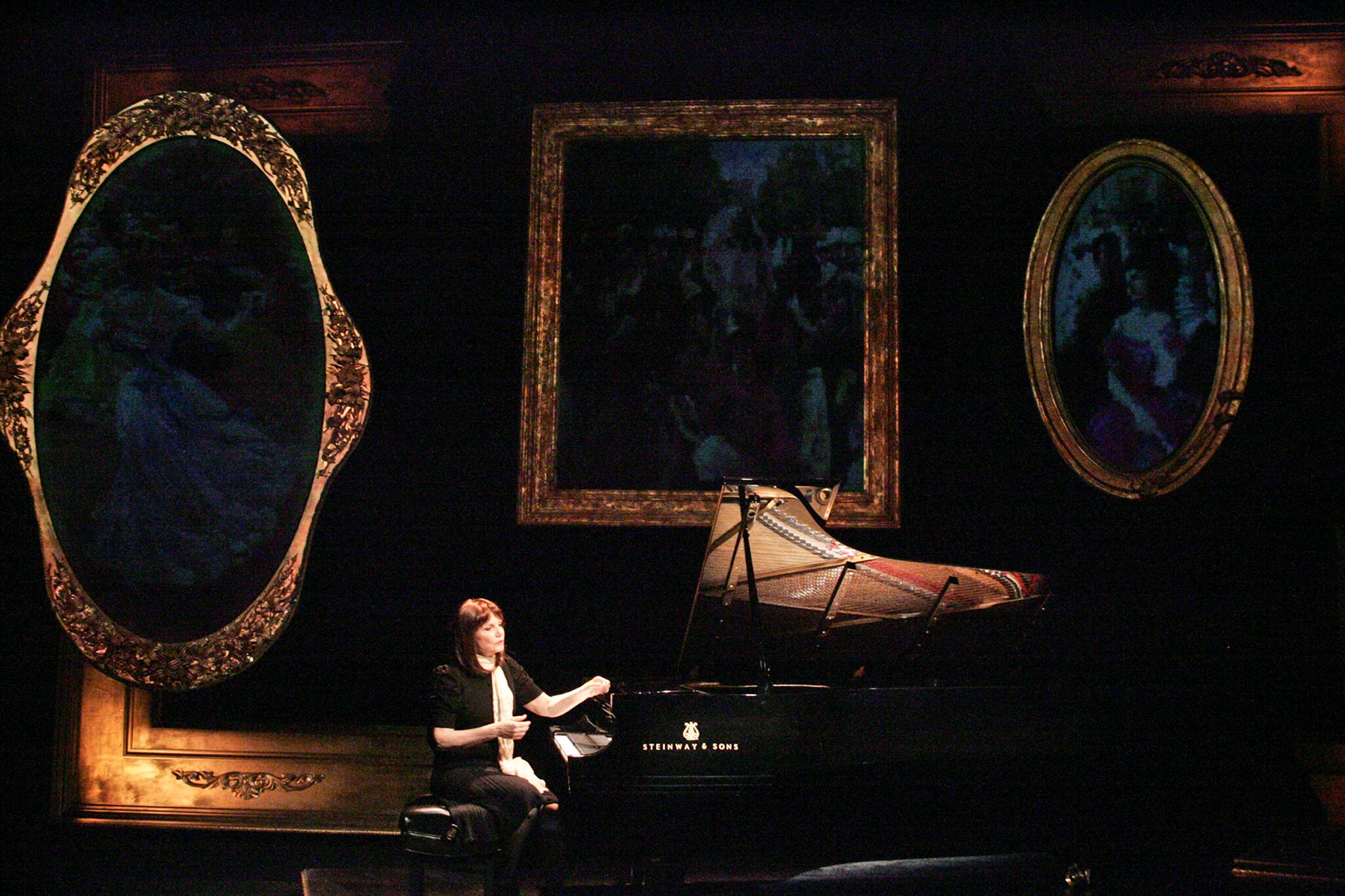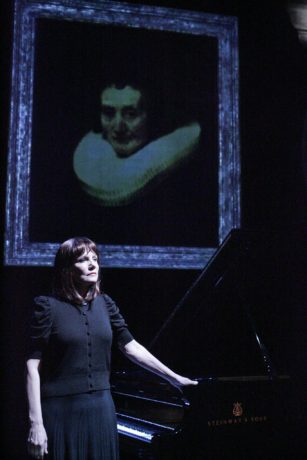
Golabek first began telling her mother’s story of her childhood flight from Vienna on the Kindertransport – the organized effort to evacuate some ten-thousand mostly Jewish children from continental Europe to the United Kingdom during the nine-month lead-up to World War II – and coming of age in wartime London in her 2003 book The Children of Willesden Lane: Beyond the Kindertransport: A Memoir of Music, Love, and Survival (coauthored with Lee Cohen). Golabek has been touring this stage adaptation by Director Hershey Felder since 2012.

As the story begins, Golabek imagines the experiences of Lisa, as a fourteen-year-old prodigy in 1938 Vienna, with an evocative description of taking the trolley across the Danube from the city’s Jewish quarter to her piano lesson in the opulent part of the city where palaces and concert halls are found.
Lisa is enchanted by the beautiful architecture and the sights, sounds, and smells of the city’s artistic elite exchanging ideas in cafés; so focused on someday making her concert debut with Edvard Grieg’s Piano Concerto in A Minor that she hardly notices that Austria has been annexed by the Third Reich.
Only when she sees that the street named for Gustav Mahler has been renamed and her professor is forced to tell her that he is now prohibited from teaching Jewish students, does reality encroach. It is only moments of stage time before the story turns to November 9, 1938: Kristallnacht – the Night of Broken Glass – an orgy of violence committed by the SA, a National Socialist paramilitary, along with German civilians against the Jews living all across the Reich.
While most German Jews had begun to see the writing on the wall in the months and years that followed the 1933 elections, (half had already emigrated to other countries prior to Kristallnacht; those who remained were waiting for family already living abroad or relief organizations to help them make their escape), the Jews of Austria were largely unprepared for how quickly their circumstances would deteriorate after the March 12 Anschluss.
Even with risky gambles, Lisa’s parents are only able to acquire one ticket for the Kindertransport – and it is quickly decided that given her musical talent, Lisa is the best equipped of the Jura children to fend for herself on foreign soil. From there Golabek recounts Lisa’s journey from an English country estate where she worked as a seamstress, to being one of many child refugees living in a youth hostel on the titular Willesden Lane, to being admitted to the Royal Academy of Music.

Mona Golabek is a masterful performer. For those less familiar with the classical repertoire, the script offers several brief asides that may deepen one’s understanding of the art form. A piano lesson from Lisa’s mother (yet another generation of pianists) draws attention to how she strives to give a voice to every one of the individual notes that make a chord.
Others might admire how the music is created by the beautifully disciplined motions created by the tensing and relaxing of the muscles from the shoulders down to the fingers.
Golabek is no less skilled as a storyteller than she is as a musician. It is not a matter of digging into the psychological reality of a character being portrayed, but to give an impression of the world and its inhabitants, as the protagonist encounters them no matter how briefly – these characters, energetically realized, appear as sketches that evoke without relying on props or costuming. Of the characters whom Lisa meets along the way, Golabek’s rendition of Gina, her new best friend on Willesden Lane, is the most lively.
Nonetheless, there are other artists at work to make Golabek’s solo performance possible. Felder, as well as adapting the book into a performance piece, has, along with Associate Director Trevor Hay, designed a set of ornate gold painted frames, inspired by the classical art of Central Europe, suspended against a nearly reflectionless black space.
Within the frames, Projection Designers Andrew Wilder and Greg Sowizdrzal present documentary images of Vienna and London, the start of World War II, the Battle of Britain and the Blitz, preparations for Operation Overlord, and ultimately both the revelation of the death camps and Germany’s defeat – allowing history to literally happen in the background.
Meanwhile, Lighting Designer Jason Bieber ensures a perfect contrast between the black and gold while also keeping Golabek’s performance out of the shadows. If there is to be a quibble aimed at the production it is that on the night I attended there are a few seconds where Erik Cartensen’s sound design actually drowned out rather than accompanied Golabek’s piano.
The Pianist of Willesden Lane comes to Washington, DC, not just at a time when it is increasingly the role of children and grandchildren to preserve the memory of those who survived or evaded the Holocaust, but when even in democratic societies, illiberal nationalist parties that would shut their doors to those fleeing war and tyranny are on the rise. In Europe, which after the Holocaust now only has an estimated 1.4 million Jews, political anti-Semitism has returned – ironically even on the island nation that gave refuge to a young Lisa Jura. Most movingly, The Pianist of Willesden Lane is a story of holding on to any sign of civilization that can allow one individual to find meaning in the darkest times.
Running Time: 90 minutes, with no intermission.
The Pianist of Willesden Lane plays through September 30, 2018, at the Kennedy Center – 2700 F Street NW, in Washington, DC. For tickets, call 202-467-4600, or purchase them online.




